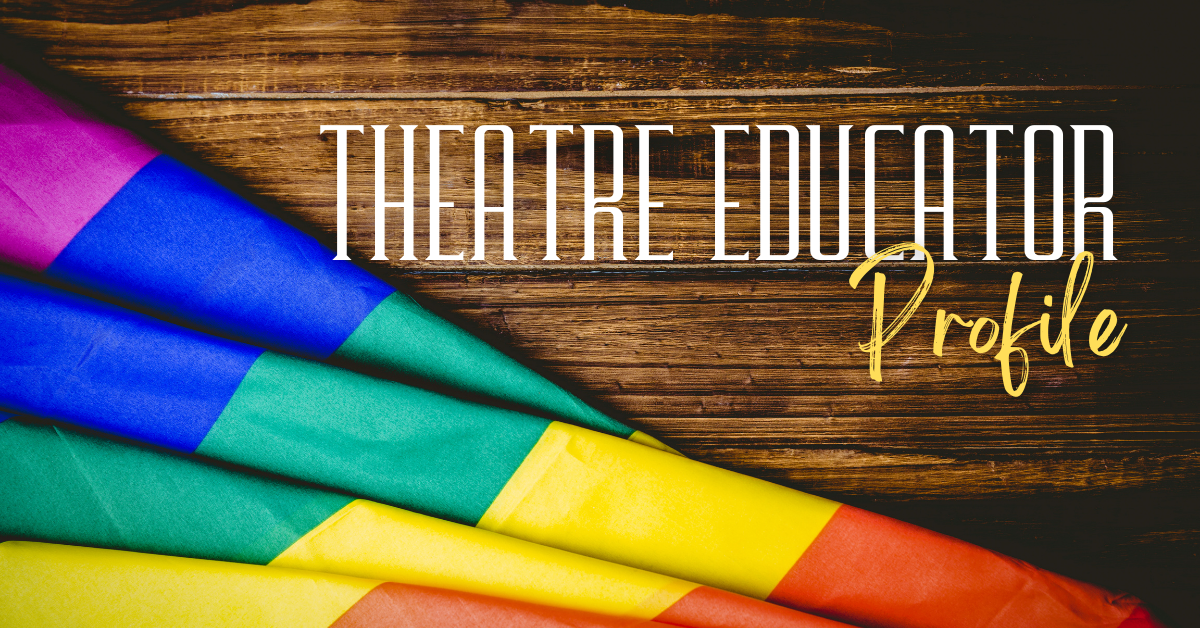Theatre Educator Profile: Jimmy
At Theatrefolk, we celebrate the theatre educators who share their stories and continue to make their classrooms and stages a warm and wonderful place for all students.
Dr. Jimmy Chrismon is a theatre educator with 17 years of experience in the public schools of North and South Carolina. He currently teaches full time as an Assistant Professor of Theatre Teacher Education at Illinois State University. He was an adjunct theatre faculty member at Winthrop University and Central Piedmont Community College. He has also worked for The Children’s Theatre of Charlotte and The Lake Norman School of the Arts. He has acted, directed, designed, and produced professionally for 24 years. He received his Bachelor of Arts Degree in Theatre Education from The University of North Carolina at Charlotte where he was a North Carolina Teaching Fellow. He received his Master of Education Degree in Theatre Education from The University of North Carolina at Greensboro. He completed his Doctor of Education Degree in Curriculum and Instruction from Gardner-Webb University. His dissertation was entitled “A Study of Theatre Teacher and School Administrator Perceptions of Traits, Characteristics, and Instructional Practices and Their Possible Role in Teacher Evaluation.” His current research focuses on trauma informed directing practices in the theatre classroom. He is the creator and host of THED Talks Podcast.
He currently resides in Bloomington, Illinois with his husband, three children, and multiple fur babies. His professional affiliations include The American Alliance for Theatre Education, The Illinois Theatre Association, The Southeastern Theatre Conference, and The Educational Theatre Association.
1. What was it like for you as an LGBTQ+ teen?
As a gay teen I was heavily involved in church where my identity as a gay man was shunned. It was something to be ashamed of and hide. I dated girls, but it never felt right. There was only one out gay person at my school, who I didn’t think I could be friends with so I avoided him. Even going into college, there were few out queer individuals in our theatre department. I went through conversion therapy and endured the consequences and aftermath of that practice until I stopped going and began to embrace that part of me with the help of friends and teachers.
2. What’s important to you in terms of supporting LGBTQ+ teens today in your classroom?
In terms of supporting LGBTQ+ teens, when I was in the classroom as a high school theatre teacher I wanted my classroom and rehearsal space to be one that students felt loved and celebrated. It was and is important to me that my student know they are loved exactly as they are, right here and right now. I wanted my students to feel seen and represented in the work we did, with the scripts on my shelves, and posters in my room. I never tolerated language that could hurt my queer students. I was a fierce advocate for them. I never felt safe being an out teacher in SC, but my students knew they had an ally in me. In the work I do now, that hasn’t changed. I simply adjusted my lens to college undergraduate students preparing to teach theatre. Every course I have deals with DEIA topics in theatre education, and I don’t shy away from the LGBTQ+ topics, nor do I shy away from being my authentic self with my students. For me that is further representation that I did not have in my theatre teacher training.
3. What is one thing you’d like to change in the drama classroom in terms of LGBTQ+
One thing I would like to change in the drama classroom in terms of LGBTQ+ topics is the representation of real and authentic queer characters in the plays available for educational theatre. I am not speaking of plays that focus on a LGBTQ+ character or topic, but simply have characters who happen to be LGBTQ+. I also think stronger representation of transgender and non-binary characters is so badly needed in theatre in general, but specifically in educational theatre.
4. What is something you want to share with teachers who have LGBTQ+ students
I want teachers to know we have an awesome responsibility and privilege to meet our students where they are. We get to know them better than most teachers in the school. We experience and explore emotions with them because they trust us. We must create spaces where they get to be their authentic selves and where their authentic selves are celebrated. Along the same lines, is to be understanding and accepting of the fact they are children and they shouldn’t have their lives figured out yet. They may explore their identity and go through many iterations of who they are as they discover that. Be present with them. Also, it is imperative to know your community norms and work within those norms. You can still be an ally in a super conservative area, it just may look different than in a more progressive area. Nonetheless, your LGBTQ+ students, whether they are out or they don’t feel safe enough to be out, see you. They look to you. They need you.



